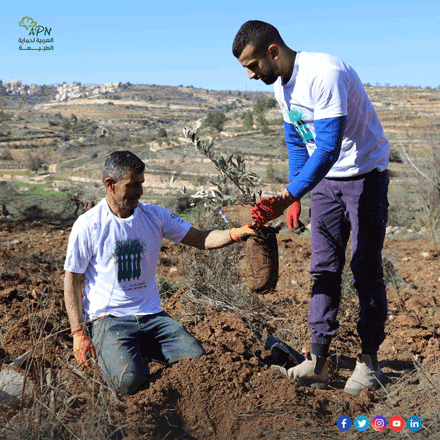You are here
Nature conservationist group plants 1,112 trees at Al Hussein Youth City
By Mays Ibrahim Mustafa - Feb 13,2023 - Last updated at Feb 13,2023

The Arab Group for the Protection of Nature has planted 1,112 trees at Al Hussein Youth City in Amman to restore the forest after damage incurred during the recent snowstorm (Photo courtesy of APN Facebook page)
AMMAN — The Arab Group for the Protection of Nature (APN) has planted 1,112 trees at Al Hussein Youth City in Amman to restore the forest after damage incurred during the recent snowstorm.
According to APN President Razan Zuayter, the planted species include the jacaranda tree, famed for its vibrant violet-coloured flowers, as well as the chinaberry tree and the shade tree, known for their expanded canopies, providing shelter from the sunlight and heat during summer.
She noted that this effort came as part of the Green Caravan programme, launched in 2003 “to reduce the rate of desertification, highlight the importance of agriculture and support small-scale farmers”.
A mature tree absorbs around 21.7 kilogrammes of carbon dioxide (CO2), and produces roughly 118 kilogrammes of oxygen per year, according to Zuayter.
“This means that in one year, the recently-planted 1,112 trees will absorb roughly 24,000 kilogrammes of CO2 and produce over 131,000 kilogrammes of oxygen,” she told The Jordan Times, noting that two mature trees can provide enough oxygen for a family of four.
Additionally, planting trees can help mitigate draught and combat climate change by increasing rainfall through the process of “transpiration”, in which trees release water vapour into the environment through the pores in their leaves, she added.
Trees also help prevent soil erosion, protect biodiversity and provide shelter and food to a wide range of animals such as birds, Zuayter continued, noting that increasing urban tree coverage also reduces surface and air temperatures.
Zuayter characterised the community effort involved in the planting process as “empowering”.
“It gives people hope and makes them feel like they can help protect their environment and contribute to the fight against climate change,” Zuayter said.
She also stressed the importance of expanding national parks, especially in fast-growing urban settings such as Amman.
“National parks can help conserve natural landscapes and enhance environmental awareness as well as public health and well-being,” she said.
APN is an independent non-profit organisation founded in 2003 by a group of environmental activists and agricultural engineers with the aim of protecting the environment and natural resources in the Arab world.
The organisation’s work started with the launch of the Million Tree Campaign (MTC) in 2001, during the second Intifada (uprising), to replant the trees uprooted and destroyed by Israeli forces, under the slogan: “They Uproot a Tree … We Replant Ten”, according to its website.
The APN president noted that the organisation has so far planted around 2.7 million trees in Jordan and Palestine since its founding.
Hala Murad, head of the Dibeen Association for Environmental Development, said that increasing green spaces in cities can help reduce flooding, as trees increase water infiltration and maximise groundwater recharge rates.
She noted that the Kingdom’s infrastructure, which relies on rainwater drainage pipe systems, “isn’t enough” to reduce flooding in Jordanian cities during periods of heavy rainfall.
“We need urban planning efforts that factor in the importance of green spaces and public parks in commercial and residential areas,” she told The Jordan Times.
Murad also stressed the importance of enhancing oversight in order to prevent all practices that pose threats to trees in Jordanian forests and national parks.
It is also necessary to “enact and enforce” legislation that mandates preserving green spaces in fast-growing urban areas, she said.
Related Articles
AMMAN — Since 2000, Israel has “uprooted, poisoned, burnt and bombed” over three million fruit trees in Palestine, according to the Arab Gro
AMMAN — Environmental organisations accredited by the United Nations Environment Programme (UNEP) in West Asia have recently issued a statem
In cooperation with the Greater Amman Municipality (GAM), representatives of the Arab Group for the Protection of Nature (APN) and Standard Chartered Bank employees on Saturday planted hundreds of olive trees at Khaled Bin Al Waleed Park in the southern Marka housing area.













